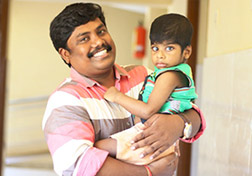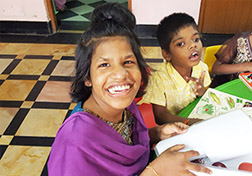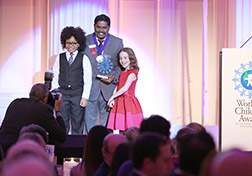
BY AMELIA MATTHEWS - Child advocate Iyyappan Subramaniyan from Chennai, was honored at the annual World of Children Awards Ceremony in New York on October 27. As the founder of Sri Arunodayam Charitable Trust, Iyyappan was recognized for the extensive work he has done to protect, rehabilitate and educate abandoned mentally and physically challenged children...
It all started with Subramaniyan’s older brother who was born with Down Syndrome. Growing up, this madeI Subramaniyan especially sensitive to the challenges families of such children face, including severe social stigma. When he was just 21 years old, he founded the Sri Arunodayam Charitable Trust to provide the first home in Tamil Nadu dedicated to such children. Thirteen years on, it remains the only state-certified reception facility for abandoned children with intellectual and developmental disabilities.
India Journal Spoke with Subramaniyan. Here are excerpts of the interview.
Q.Do you think attitudes towards mentally/physically challenged children have changed in India over the years?
A.Yes, to a certain extent. When I started my home 14 years ago, there were no other homes for such children in Chennai city. There were a couple of not-for-profit centers but they mainly functioned as day care centers or as a support service. Today, we have a whole lot of organizations working for this cause. In addition, social media is enabling a new generation of people to take up social causes, spread awareness, and galvanize action for such causes.
Q. As you mentioned in your back story, the village ostracized your family because of your brother. Would they do the same today?
A. It is likely that they would be a little more tolerant today. However, for a huge number of remote Indian villages, the economic and social systems are still quite primitive. The effects of a lack of education, communications and exposure to the rest of the world, new thinking and technologies can still be felt there. It is still a lot easier to place the blame on the vulnerable child rather than to take responsibility for their role in perpetuating such mental/physical disabilities.
Q. If attitudes have not changed much, what do you think is needed to drive this change?
A. Attitude change can only come about through education and spreading awareness. A consistent voice is far more powerful than a loud one. So, we cannot afford to lose heart at the slow pace but must continue to work consistently to spread the message.
Q. How has your facility grown since inception?
A. From a single child in 2003, Sri Arunodayam has come a long way. We’ve rescued 325 children of which 77 have been reunited with their families and 56 have been transferred to other homes for specialized care. Due to the nature of their illnesses and disabilities, the mortality rate of these children is high. Many of them don’t survive despite us providing the best medical care and comfort that we can afford. At present, we have 106 precious lives in our care.
Story Contd. from C1
Q. How are you funded?
A. Sri Arunodayam receives funds through individual donors, institutional donors, state government grants, and foreign and domestic donations received through global platforms such as GlobalGiving and GiveIndia, among others.
Q. What are the major services you provide to the kids?
A. We Nurture, Rehabilitate and Restore. The work of nurturing begins when we rescue the kids. Then we feed, clothe, provide medical care and nurture them back to health and wholeness. This is done by our team of doctors, nurses, physiotherapists and caregivers. Rehabilitation is life-long. As they recover, we assign physiotherapists and special educators to provide personal care based on their physical/mental condition and abilities. Each child’s progress is regularly assessed and evaluated, and our Special Educators set individual goals for them to attain. Through Prayatna - our vocational training unit, children 18 years and above, are trained in vocational careers such as the making of paper bags, envelopes, jewelery, candles and other household items, and book binding. In this way we help them integrate into society and become as self-sufficient as they can be. Restoration is of utmost importance as we believe that a family set-up is the best environment for a child to grow up in and develop, we make every attempt to trace the abandoned child’s family and try and re-unite the child with them.Our legal department works on such cases and 77 children have been re-united with their families so far.
Q. Briefly share one of the most touching stories of a child you have helped?
A. Sudarshan, was only 9 months old when his parents abandoned him on the streets of Trichy. He was rescued by ChildLine volunteers who contacted several organizations to give him shelter but none accepted him. He came to us in great need of medical care. Sudarshan has more than just an intellectual disability; he is also a hermaphrodite – more commonly known as an intersex person, because he has both male and female genitalia. This condition occurs approximately once in every 4,500 births where a baby seems to have a mixture of both female and male parts. To be honest, we did not know how to cope too, but we consulted with a good medical team and learned how to take care of him. From a listless little boy, to the vivacious and happy child that he is today, I am deeply indebted to my team of physiotherapists, special educators and caregivers who never ever gave up on him.
Q. Who are some of your role models/ heroes who have inspired you to carry on?
A. Vazhimugam my brother, whose struggle became my life’s mission; my parents; my sister; my mentors – especially the late Rev. Sister Mary Theodore, (who received the Medal of the Order of Australia, and the Dunlop Asialink Medal) the Founder of MITRA - one of the best residential schools for the differently abled in Chennai. I also deeply admire Mother Teresa, a true humanitarian ; my faithful donors and trust-worthy friends who travelled this 14-year journey with me and inspired me with the strength to carry on through the darkest of situations.
Q. What is your reaction to the award?
A.I am simply ecstatic! Although I have received many awards at State and even National level, I honestly never expected to be honored with a global recognition. I cannot even begin to express what a huge honor it is for me and my organization!
Q.Do you think awards are a validation? Do they help in other ways like for example getting more funding?
A.Yes, especially if the selection committees and governing boards are reputed for their high standards and impartial and impeccable vetting processes. Awards help in other ways too. One of the clearest is that it boosts employee morale and the organization’s work and reputation become more measurable for its existing donors who are reassured that they have made a good choice. For potential donors, an award plays a huge role in persuading them to partner with the organization. The Award further provides a unique opportunity to share the organization’s story with the world at large.
Q. What are your future plans?
A. I will be working with World of Children to build a new home that can take in an additional 100 abandoned, mentally challenged little girls. I am in the process of reordering Prayatna to become a one-of-a-kind inclusive vocational center for both the mentally challenged and the differently abled. I am working on developing a strategy for the implementation of community-based rehabilitation services for rural disabled children. More immediately, I am preparing to start my “Rehabilitation on Wheels” program when I get back to India. This involves making rehabilitation services mobile. A fully equipped ambulance with physiotherapists and a medical staff on board will tour villages and remote areas and provide free consultation and therapy for these children. We are also preparing to launch the “Special Mom” program next year, where we will identify 15 deserving, heroic mothers who are challenging the odds by personally bringing up their special children with little or no help from their families or societies.




 RSS Feed
RSS Feed
